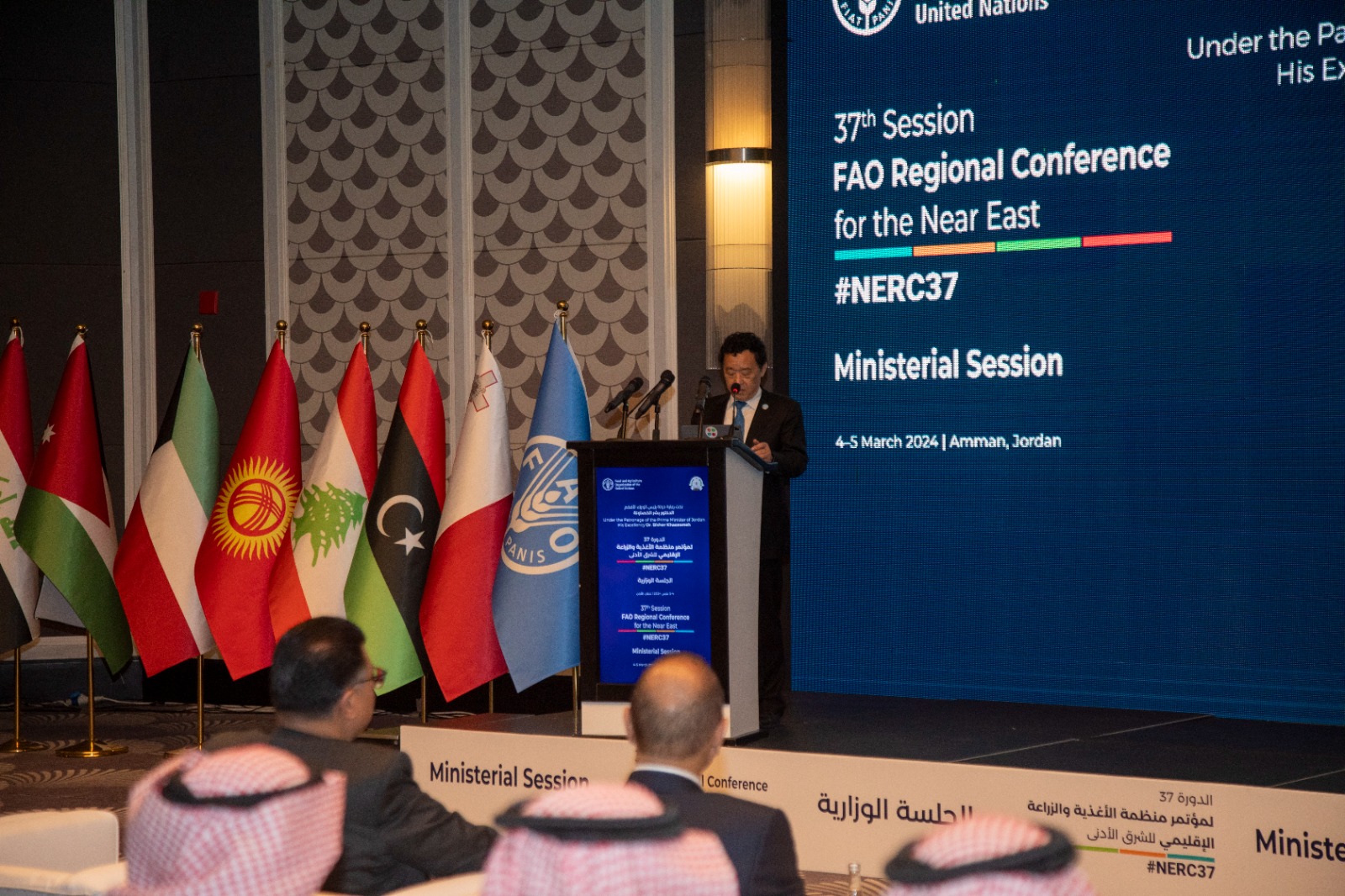Rise in hunger levels in NENA region of great concern
Director-General addresses 37th session of FAO Regional Ministerial Conference for the Near East and North Africa

In his address to the conference, Qu expressed his hope that the deliberations and actions arising from the meeting would help mitigate the challenges we are all facing.
©FAO / Abdelrahman Issa
Amman - The situation in Gaza, coupled with protracted crises in Sudan, Syria, and Yemen, is of "great concern," the Director-General of the Food and Agriculture Organization of the United Nations (FAO), QU Dongyu, said Monday as he addressed the 37th session of the FAO Regional Ministerial Conference for the Near East and North Africa (NENA).
The conference in Amman brought together government officials, academics and representatives of the private sector and civil society from the region and took place against the backdrop of a worrying rise in hunger and malnutrition estimates.
According to FAO's latest figures, hunger in the Arab States reached its highest value since the start of the millennium in 2022, with 59.8 million undernourished people. This represents a 75.9 percent increase from 2000, which corresponds to 12.9 percent of the population, well above the global average of 9.2 percent.
The situation has since reached a critical point in Gaza, where the population is experiencing catastrophic levels of conflict-induced food insecurity and a high risk of famine.
During his address to the conference, Qu emphasized the crucial role played by FAO in Gaza, particularly in terms of providing emergency relief and participating in rebuilding efforts. FAO is part of the joint UN flash appeal and is closely coordinating with the wider UN family and partners in responding most appropriately and effectively, in line with its mandate.
FAO has also issued a call for $20 million in the Nov 2023 UN Interagency Flash Appeal and plans to reactivate the production of perishable, highly nutritious food that cannot be imported as food aid, including fresh milk, meat, and vegetables, Qu said.
Overlapping crises
The crisis in Gaza adds to multiple long-standing challenges facing the region. These include the negative impacts of the climate crisis, low per capita freshwater availability, rising populations and urbanization, as well as heavy dependence on imported food.
Furthermore, overlapping crises such as the COVID-19 pandemic, the effects of ongoing conflicts and war in other parts of the world, along with growing economic and fiscal challenges, particularly the increase in food prices, have compounded these difficulties.
All these challenges are impacting global agrifood systems, emphasizing the need for an urgent transformation of our agrifood systems to become more efficient, more inclusive, more resilient, and more sustainable, Qu said.
"For this reason, the theme of this Regional Conference is 'accelerating' this transformation – it could not be more relevant and timelier than now," Qu said.
In the NENA region in particular, "we are seeing a worrying trend of a continuous increase in hunger and malnutrition in the past years," Qu said.
With approximately 60 percent of the region’s population suffering from hunger and more than half of the population not able to afford a healthy diet, there is a strong reliance on imported food, leading to rapid soil erosion and depleting agricultural resources.
That is why "there is no more time to waste in controlling the damage caused – we urgently need to safeguard our agrifood systems for current and future generations. To do this, we need a shared vision, foresight, ownership, an implementation strategy, and a clear path leading to impact and results, in the short, medium, and long term," Qu told the conference.
The opening of the 37th session was also addressed by the Prime Minister of Jordan, Bisher Khasawneh, who expressed his concern over the situation in Gaza and thanked Qu for attending the conference, saying Jordan was working hard to transform its food systems across the value chain to boost food security and economic development.
The conference is being chaired by Jordan's Minister of Agriculture, Khalid Al- Hanifat.
Conference priorities
FAO has a battery of critical instruments designed to support the transformation of agrifood systems in the region and help achieve the 2030 Agenda for Sustainable Development, as well as the UN's Sustainable Development Goals. These include FAO's Strategic Framework 2022-31, flagship initiatives such as the Hand-in-Hand and the One Country One Priority Product, as well as a strong focus on science, innovation, and technology.
However, "We need to do more and better together," Qu said.
The Director-General went on to highlight some key areas that in his view require more focus and attention. These include better use of science, technology and innovation; more trade, particularly intra-regional trade; encouraging foreign and national investments, both from the public and private sectors; and more action through efforts such as the Water Scarcity Initiatives to manage the adverse impacts of the climate crisis.
The conference is to discuss four major priorities for FAO to organize its support and maximize its impact across countries in the NENA region over the next two years.
These are: 1) Rural transformation and inclusive value chains, which involves addressing challenges such as high rural unemployment, youth migration to cities, rural poverty and the widening rural-urban divide; 2) Food security and healthy diets for all, which involves FAO providing its support to Members to better respond to challenges posed by the growing divide between food supply and demand driven by population growth and rising income, in the face of limited natural resources (water and land), and the growing problem of malnutrition, poor food safety and quality; 3) Greening agriculture: addressing water scarcity and climate action; and 4) Building resilience to multiple shocks, which involves FAO's support to Members in addressing the challenges arising from protracted conflicts and multiple shocks and crises faced by agrifood systems.
Contact
FAO News and Media (+39) 06 570 53625 [email protected]
Nicholas Rigillo FAO News and Media (Rome) [email protected]
